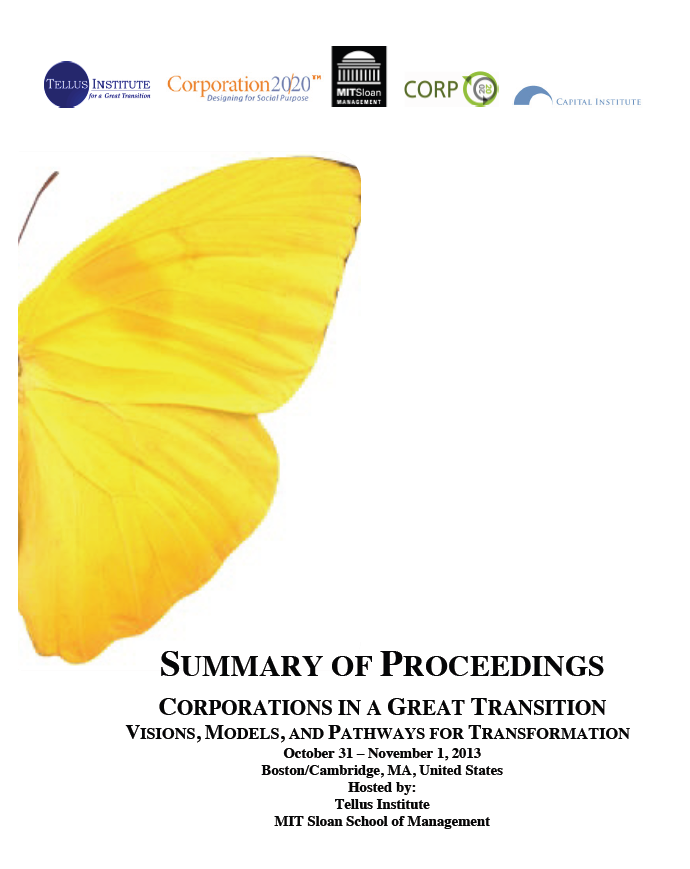Setting the StageDebates surrounding the future of the corporation are typically defined as stark choices between government regulation and free markets. Corporation 20/20 posits a third path: system redesign. It is a path that recognizes the historical and legitimate public role in corporate design; the necessity of respecting universal values while recognizing the drawbacks of overly intrusive government; and the creative potential but inherent limitations of voluntarism and unfettered markets. Reaching beyond mainstream corporate social responsibility (CSR), Corporation 20/20 will chart a path that embeds social purpose in the organizational âgeneticsâ of corporate structure while helping to build high-performing organizations. Failures in accountability and governance during the last few years have severely undermined public trust in business. A disenchanted investor class has given rise to an unprecedented activism by institutional shareholders. At the same time, the clamor for reform of corporate governance has been growing in many nations. Several promising new voluntary and quasi-binding international agreements regarding human rights, transparency, and governance have emerged, alongside a number of company- and sector-specific efforts to strengthen accountability. Meanwhile, groups in California, Minnesota, and the UK are advancing legislation to reconstitute corporate purpose via changes in directorsâ duties. The making of a movement is palpable. As pressures for reform intensify, many observers view incremental change as insufficient to achieve the needed transformations in the character and purpose of the corporation. Ironically, the greatest failures in corporate conduct have occurred simultaneously with rapid expansion of the CSR movement. From its roots in the 1970s, CSR has grown into a substantial force in many industrial nations, while emerging economies such as Brazil, South Africa and India, are becoming increasingly engaged through their adaptation of emerging CSR concepts and practices. Codes of conduct are nearly universal at major companies, and the scrutiny of labor, governance, and environmental and reporting practices is accelerating. Yet, for all apparent progress, it is clear that formidable barriers persist to embedding social purpose in corporations. For companies that are publicly traded, one reality overwhelms all others: relentless pressure to deliver short-term shareholder gains. For privately owned companies, access and cost of capital are no less formidable obstacles to the pursuit of long-term wealth creation. Former Medtronic CEO Bill George, who led his company to a global position in medical technology, describes the problem of capital pressure succinctly âIt starts with the New York Stock Exchange...with security analysts. They call and ask, âAre you going to make the numbers? Weâve got you down for 34 cents â you going to make it?â And you ask yourself, do I want to go on CNBC and be made fun of because I only made 32 cents? Your stock gets inordinately punished...If your earnings are up 15 percent but they expected 20 percent, then your stock will go down â not 5 percent, but 25 percent. Then youâre vulnerable to a takeover.â As those inside and outside of business rethink the nature and purpose of corporations, three conditions have impeded progress in translating unease into a broad-based movement for fundamental change. One is the limited awareness of how received wisdoms embedded in economic and management theoryâamoral individuals, unwavering economic rationality, productivity and competitiveness above all other valuesâshape both management theory and corporate conduct. A second is the lack of an overarching framework â visions of how the future corporation must be designed â to provide a shared platform for various reform streams. Third is the absence of a cohesive movement built on common values and progressive principles that transcend size, sector, and location of individual corporations. Amidst unprecedented growth in the scale, reach and footprint of corporations, sufficient evidence exists to support the possibility of a latent but powerful movement to reshape the purpose of corporations in a form that aligns with 21st century imperatives. |
Key RESOURCES
|
 |
SUMMARY OF PROCEEDINGS
October 31 - November 1, 2013 Roundtable event Summary of Proceedings |
Video Interview with Allen White at Yale Univ.
| |
Redesigning Finance: Pathway To A Resilient Future
| |
2nd Summit Resources
 |
SECOND SUMMIT PAPER SERIES
A collection of 8 papers exploring key components of corporate design |
SECOND SUMMIT SUMMARY OF PROCEEDINGS
|
1st Summit Resources
 |
FIRST SUMMIT VIDEO
A one hour video summary of the Summit on the Future of the Corporation. |
 |
FIRST SUMMIT PAPER SERIES
A collection of 10 papers exploring key components of corporate design |
FIRST SUMMIT SUMMARY OF PROCEEDINGS
|


 Corporations in a Great Transition
Corporations in a Great Transition